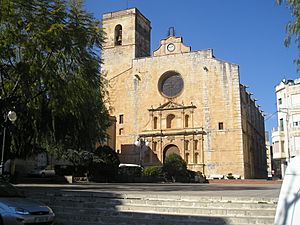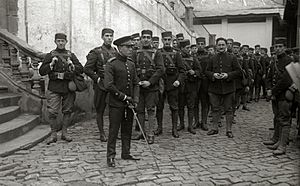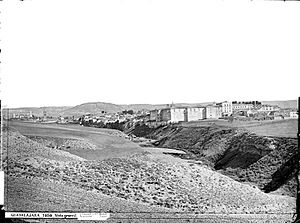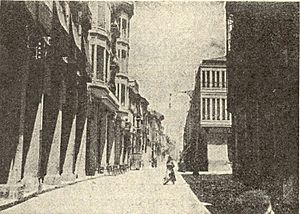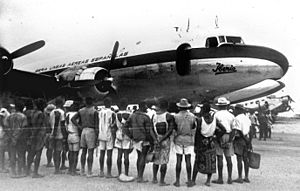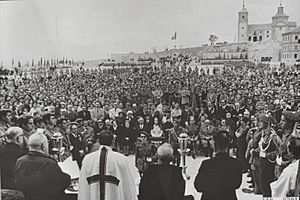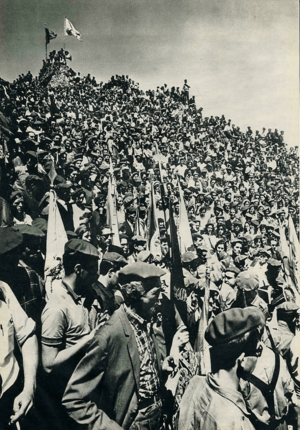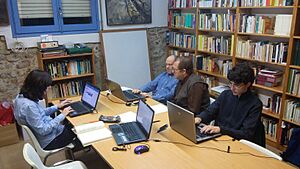José María Sentís Simeón facts for kids
Quick facts for kids
José María Sentís Simeón
|
|
|---|---|
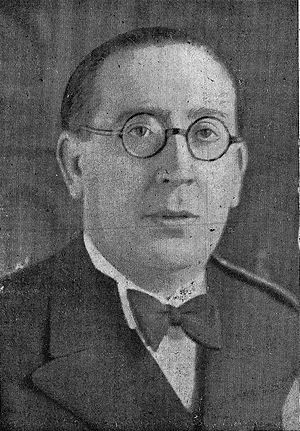 |
|
| Born |
José María Sentís Simeón
1896 Riudoms, Spain
|
| Died | 1989 (aged 92–93) Cambrils, Spain
|
| Nationality | Spanish |
| Occupation | soldier |
| Known for | official |
| Political party | Carlism, FET |
José María Sentís Simeón (1896–1989) was an important Spanish figure. He was a politician, a government official, and a soldier. He is best known for being the head of prisons in Spain for eight months in 1942–43. He also served as the civil governor of Guadalajara and Palencia during the early years of Francoism, a period when General Franco ruled Spain. Later, from 1964 to 1967, he was a deputy in the Cortes, which was like the Spanish parliament. For most of his life, he was an active member of the Carlist movement. From 1962 to 1965, he was the Secretary General of Comunión Tradicionalista, a major Carlist group. He retired from the army with the rank of a colonel.
Contents
Early Life and Family Background
José María Sentís Simeón came from a well-known family in Catalonia, a region in Spain. For three generations, his family members were doctors. His great-grandfather, Jaume Sentís Master, moved to Botarell in the late 1700s and worked as a surgeon.
His grandfather, Bernard Sentís Toldrà (1807–1881), moved to Riudoms. He was a doctor and also interested in science. Bernard corresponded with the Barcelona Medical Academy, sharing his medical experiences. Two of Bernard's sons, Jaime Sentís Gran and Eusebio Sentís Gran (1853-1921), followed the family tradition. Jaime became a doctor, and Eusebio, José María's father, became a pharmacist. Eusebio was one of the main taxpayers in Riudoms.
José María's father, Eusebio, married Ramona Simeón Polles (1853–1919). They had at least seven children. The Sentís family was very religious and Catholic. José María's uncle, Caetano Sentís Gran, was a priest and a respected intellectual. Two of José María's cousins also became priests, and his sister Dolores became a nun.
José María himself first trained to be a priest. He studied at the Tarragona seminary for six years after attending a college in Riudoms. However, to his family's surprise, he decided to leave and pursue a military career instead. He then joined the Academia de Intendencia in Àvila and graduated in 1920 as an infantry officer. He was assigned to a regiment in the Tarragona military district.
In 1927, José María married Josefa Mariné Sancho (died 1987) from Tarragona. They settled in Tarragona and had two daughters, Rosa María and María Dolores. José María had six grandchildren. His older brother, Eusebio, who was the mayor of Riudoms in the 1920s, was killed in 1936 during the Spanish Civil War. His sister Dolores escaped and later worked in education.
Military Service and Key Events
In 1921, Sentís volunteered to serve in Morocco. He spent about two and a half years there, fighting in the Rif War. He returned as a lieutenant to his regiment. By 1927, he became a captain and led a machine-gun unit.
When the Second Spanish Republic was formed in 1931, Sentís remained a captain. The new government didn't fully trust him because he openly supported the Carlist movement and had very conservative views. For a while, he didn't have a clear assignment.
However, in 1934, during the revolutionary unrest in Catalonia, Sentís played a key role. He commanded troops that took control of the government building in Tarragona, which had been occupied by revolutionary groups. He helped stop the uprising in the province.
Before the Spanish Civil War, Sentís was involved in building up the Carlist organization in Tarragona. He helped with paramilitary training for Carlist fighters, known as requetés, and secured weapons for them. He also connected the Carlists with other military plotters.
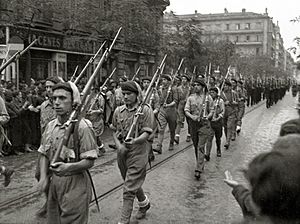
When the military uprising began on July 18, 1936, it failed in Catalonia. Sentís went into hiding and then escaped from Barcelona on an Italian ship using fake French papers. He traveled through France and entered the Nationalist zone in Navarre.
He immediately reported to Burgos and was assigned to a unit on the Madrid front. He was wounded twice by enemy mortar fire and spent several months in the hospital. In November 1937, he was made commander of Tercio de Montserrat, a Catalan Carlist battalion. He led the battalion for only two months and was then moved to administrative duties.
Government Roles in Provinces
In December 1937, Sentís, now a comandante (major), was appointed Delegate for Public Order in Palencia province. He spent six months in this role, often recovering from his injuries in a hospital. He was known for having good relationships with religious leaders and for enforcing strict moral standards.
In June 1938, he was transferred to the same position in Navarre for seven months. In January 1939, after the Nationalists took control of his home province of Tarragona, he returned to Riudoms.
In February 1939, Sentís was appointed civil governor of Guadalajara. Since much of the province was still controlled by the Republicans, he set up his office in Sigüenza. During his 20 months there, he handled regular administrative tasks. One of his lasting achievements was starting the Nueva Alcarria weekly newspaper. He also tried to bring the military engineering academy back to Guadalajara. He sometimes had disagreements with the local Falange leaders, especially over managing supplies. When he left Guadalajara in 1940, he was named an "adopted son" of the city.
In October 1940, Sentís became the civil governor of Palencia again. He continued with administrative work, dealing with supplies, prices, and reconstruction. He again faced political conflicts with the Falange, often over supplies and promoting Carlist symbols. Despite these issues, his position was strong in early 1941, and he even met with General Franco. However, his relationship with Serrano Suñer, an influential figure, worsened. In May 1942, Sentís left his role as civil governor.
Important Central Government Roles
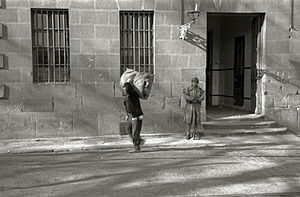
In May 1942, Sentís was appointed technical director of Consumption and Rationing. This job involved managing food supplies, which were scarce at the time. This role was short-lived. Two months later, Esteban Bilbao, the Carlist Minister of Justice, suggested Sentís become the Director General of Prisons. Sentís later said that Franco himself insisted he take the job.
Promoted to lieutenant-colonel, Sentís also became president of the Permanent Commission of the Central Board for Sentence Reduction through Work. This board oversaw a system where prisoners could reduce their sentences by working. During his time, the number of prisoners was decreasing significantly. His term as Director General of Prisons lasted eight months. When Bilbao was replaced as minister, Sentís was also replaced in April 1943.
After 1943, Sentís's major government assignments ended. He gradually became less involved in high-level politics. At some point, while still in the military, he became Secretary of the Supreme Council of Military Justice. He seemed to prefer this less public, bureaucratic role. By 1948, he was a colonel in the infantry. He generally kept a low profile, appearing in the news mostly for religious or veteran events.
From the mid-1940s, Sentís also held a management role in Cámaras Agricolas Pro-Guinea del Café. This organization was set up to develop coffee production in Spanish Guinea, a Spanish colony. This job was financially rewarding. When it conflicted with his military duties in the mid-1950s, Sentís chose to retire early from the army rather than leave his Guinea connection. In 1954, he received the Gold Medal of Penitentiary Merit. In 1957, Sentís was appointed the provincial delegate for the Ministry of Housing in Toledo. He held this job until 1961, when he retired at age 65.
His Role in the Carlist Movement
Sentís inherited his political views from his father, who was active in the Carlist organization in Tarragona. Sentís himself is first mentioned as active in Carlism in the mid-1930s. His strong Carlist beliefs were clear during his time as governor in Guadalajara and Palencia.
After some clashes between Carlists and Falangists in 1942, he was seen as a strong supporter of the traditional Carlist views. However, later in the 1940s and early 1950s, his involvement seemed less active, possibly because he was an active military officer and couldn't openly oppose the government.
Around the late 1950s, Sentís became actively involved again with Comunión Tradicionalista, the main Carlist organization that supported Don Javier as king. Because he had a good record with the Franco government, Sentís was welcomed into the organization, which was trying to work more closely with the regime. He quickly joined the Junta Nacional, the Carlist political executive, and became the National Secretary of Organization, similar to a party's interior minister.
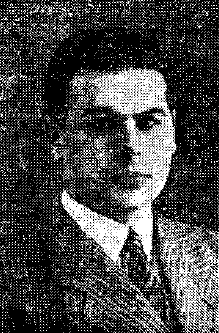
In the early 1960s, the Carlist movement was going through changes. A group of younger members, led by Carlos Hugo, started to push for new ideas, focusing on social values. These "Hugocarlistas" were seen as too radical by older Carlist leaders like José Luis Zamanillo. Sentís found himself in the middle of this disagreement.
Initially, he seemed to support the older, more traditional group. In 1962, he joined their new organization for former Carlist fighters. However, later that year, when Zamanillo resigned as Secretary General due to the growing influence of Carlos Hugo's group, Sentís accepted the nomination to take his place. This was a very important position within the party.
Peak of Carlist Influence
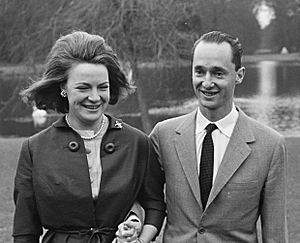
As Secretary General, Sentís was second only to the main Carlist leader, José María Valiente. His role was largely to coordinate the work of the Carlist national board. He also handled the party's finances and planned the budget.
However, Carlos Hugo's group was constantly changing the party's structure to gain more control. They created new positions to reduce the power of the traditional Carlist leaders. A new plan in 1963 confirmed Sentís as general secretary but placed the followers of Carlos Hugo in key behind-the-scenes jobs.
Sentís didn't seem to fully realize the power struggle happening. He remained loyal to Don Javier and acted as a link between him and the increasingly isolated Zamanillo. The Hugocarlistas saw Sentís as a traditionalist, but they needed him because he had connections to the Franco government. For example, his cousin, Carlos Sentís, managed a major news agency, which was useful for Carlos Hugo's media strategy.
In 1964, Sentís helped with public campaigns promoting Carlos Hugo and his wife Irene. This unintentionally strengthened Carlos Hugo's group. The Hugocarlistas even suggested that Sentís be appointed to the Cortes (parliament). Indeed, in 1964, he was nominated a member of the Consejo Nacional del Movimiento, which gave him a three-year term in parliament.
The year 1964 was the peak of Sentís's role in the Carlist party. Later that year, Carlos Hugo's group became even more radical and decided to openly push their progressive agenda. Although Valiente and Sentís were called "national Carlist leaders," Carlos Hugo and his team were truly in charge. They decided it was time to remove the traditionalists from the party leadership.
In 1965, they abolished the role of Secretary General altogether. Sentís's dismissal was presented as an honorary retirement. The claimant, Don Javier, sent Sentís a warm letter, thanking him for his contributions and suggesting the need to make room for younger members. Since Sentís had been a rather passive member of the leadership, his removal didn't cause much controversy at first.
Later Life and Legacy
By 1966, the Carlist leadership was mostly made up of Carlos Hugo's followers. José María Valiente was almost alone among the traditionalists in the top ranks. It's unclear if Sentís, who was then 70 years old, fully understood that he was a victim of this internal struggle. In 1966, he accepted a position in a new advisory council within the organization. This council mostly included older Carlist members and was meant to give them a prestigious role while the Hugocarlistas maintained control.
In public, Sentís was seen as a respected veteran. In 1966, Franco awarded him the Grand Cross of Civil Merit. However, when his term in the Cortes ended in 1967, it was not renewed. Without his parliamentary role or any government positions, Sentís was no longer as useful to the progressive Carlists. There is little information about his activity in the party in the late 1960s, and he likely became less involved. In 1970, he moved permanently from Madrid to Tarragona.
Unlike some other traditionalists, he did not leave the organization, even as it became the more left-leaning Partido Carlista. In 1971, he became the honorary president of the Catalan Partido Carlista board. Oddly, at the same time, he publicly confirmed his strong loyalty to Franco.
By 1972, Sentís seemed to be outside the Partido Carlista. He focused on his connections in Guadalajara and supported educational, cultural, and religious projects in Riudoms. Shortly before turning 90, he said in an interview that "wars seem barbaric to me, especially civil wars." He also expressed support for Catalan identity and some Catalan politicians.
In 1997, the Riudoms town council declared Sentís an "illustrious son" of the town. They recognized his contributions to building schools and rebuilding churches in Riudoms and the surrounding area. A long street in the town was also named after him.
However, in 2011, some local councilors demanded that this decision be reversed. They argued that the honor was not compatible with the Historical Memory Law, which deals with Spain's past. They claimed that as head of prisons, Sentís was responsible for harsh actions during the Franco era. Since then, various groups and individuals have continued to make this claim, sometimes calling him a "Fascist" or making fun of him as "caudillo of Riudoms by the grace of God" and "Francoist illustrious son."
See also
 In Spanish: José María Sentís para niños
In Spanish: José María Sentís para niños
- Carlism
- Carlo-francoism
- Terc de Requetes de la Mare de Deu de Montserrat


